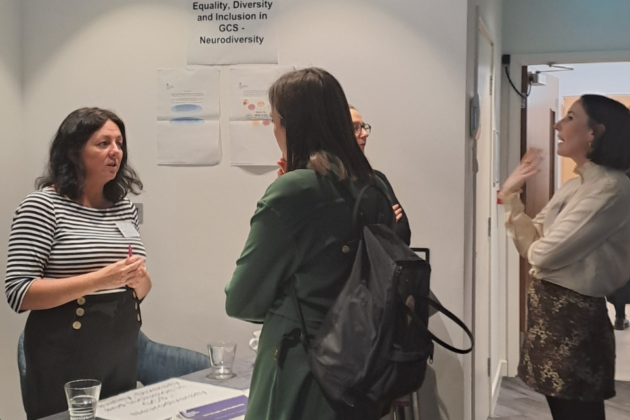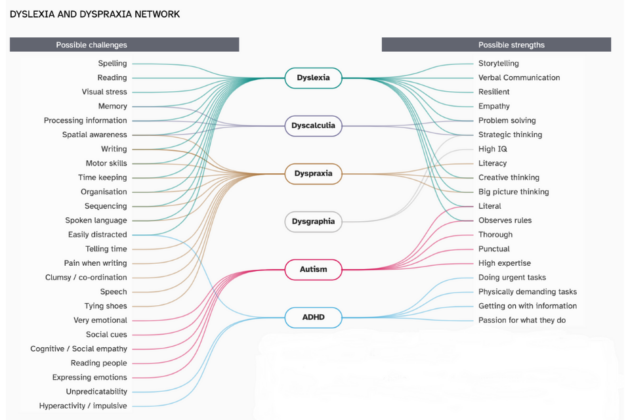Celebrating neurodiversity at GCS New Members’ Event
Linda Murray, from the Government Communication Service (GCS) People and Membership team, shares her experience of hosting a stall dedicated to celebrating and supporting neurodiverse people, at a recent GCS New Members’ Event, which was held during Neurodiversity Celebration Week (18-24 March).

Last week, I hosted a marketplace stall on neurodiversity at the New Members’ Event. The aim of the stall was to showcase to new GCS members the excellent work happening to support equality, diversity and inclusion across the GCS, and highlight how the skills of neurodivergent colleagues are so vital in the communications profession.
To ensure the content was relevant, inclusive and felt authentic, I initially spoke to colleagues in my team who were neurodivergent to learn about their experiences. They shared with me the excellent work being done by Government Communications Headquarters (GCHQ) to promote and support neurodiversity in their organisation.
The skills and challenges of neurodiversity
Created by the Civil Service Dyslexia and Dyspraxia network, I shared a diagram with those who visited the stall to help demonstrate the strengths neurodivergent staff can bring to our workplace. Attendees said they could really see themselves in the diagram and it highlights so well why we need all types of thinkers to get the best from our work.
Here is what the diagram shows:
Dyslexia
- Possible challenges: Spelling, reading, visual stress, memory, processing information, spacial awareness, writing, motor skills, time keeping, organisation, sequencing, spoken language, easily distracted.
- Possible strengths: Storytelling, verbal communication, resilience, empathy, problem solving, strategic thinking, creative writing, big picture thinking, literal, observes rules.
Dyscalculia
- Possible challenges: Memory, processing information, spatial awareness.
- Possible strengths: Problem solving, strategic thinking.
Dyspraxia
- Possible challenges: Spatial awareness, writing, motor skills, time keeping, organisation, sequencing, spoken language, telling time, pain when writing, clumsy/co-ordination, speech, tying shoes.
- Possible strengths: Literacy, creative thinking, big picture thinking.
Dysgraphia
- Possible strengths: Strategic thinking, high IQ.
Autism
- Possible challenges: Very emotional, social clues, cognitive/social empathy, reading people, expressing emotions.
- Possible strengths: Literal, observe rules, thorough, punctual, high expertise.
ADHD
- Possible challenges: Easily distracted, unpredictability, hyperactivity/impulsive.
- Possible strengths: Doing urgent tasks, physically demanding tasks, getting on with information, passion for what they do.

Speaking with GCS members: their experiences
I was genuinely touched and moved by the interest and willingness of GCS members to share their experiences of neurodivergence in the workplace. Some experiences were really positive and others less so, but the honesty and openness in which everyone spoke was incredibly inspiring. They shared some great tips on what helps them in their work:
- Thinking about their strengths and challenges, and what managers can do to support them
- Keeping a workplace passport detailing reasonable adjustments, making it easier and quicker to put in place what’s needed when moving between roles.
Engagement with managers
It was encouraging to see lots of managers seek out advice on how to best support neurodivergent staff. While managers should look to their HR teams for guidance applicable in their organisation, I was also able to signpost the GCS Equality, Diversity and Inclusion Action Plan and give some tips that I learned during my research for the stall. These included:
- Having open and honest conversations with every person you manage, asking them how they like to work and what they need from their working environment
- Speaking to those you manage about whether there are any triggers which make them struggle, for example loud noises or bright, flashing lights
- Working with HR teams to see what support can be provided
- Providing regular feedback and reflection.
This experience was rewarding and challenging, and it made me more aware of the strengths of neurodiverse people. It also made me aware that as a part of the GCS People and Membership team, I must continuously improve upon what I do to support others in the workplace.
